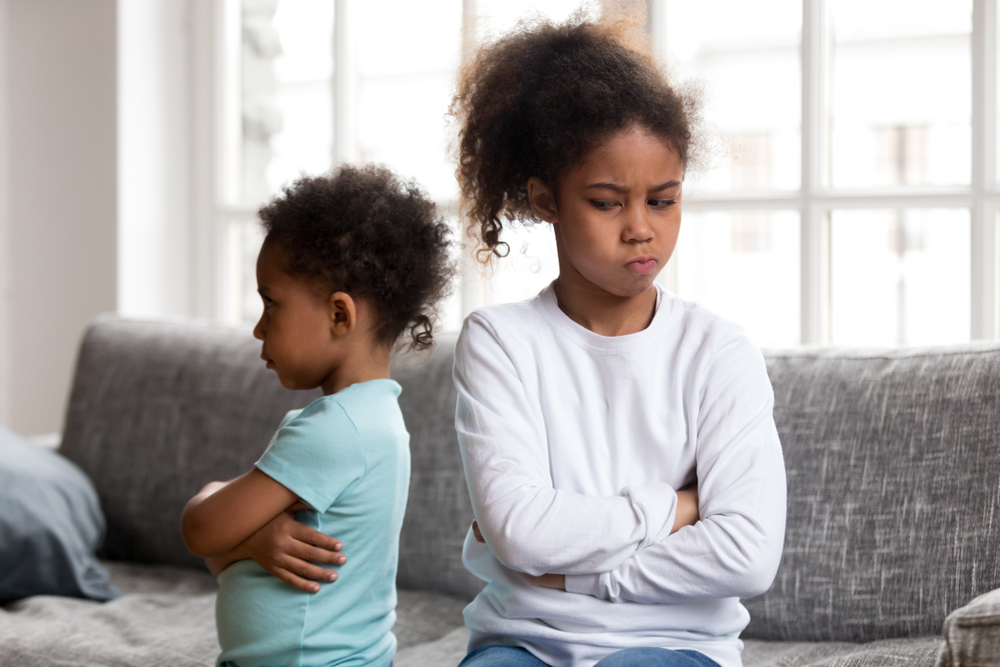You’re probably reading this while hiding in the bathroom, desperately searching for answers as World War Three erupts in your living room again. The screaming, the tears, the dramatic declarations of hatred between kids who were best friends five minutes ago, sound familiar? You’re not losing your mind, and you’re definitely not alone in wondering if your house will ever be peaceful again.
Here’s the reality check nobody talks about, sibling fights are basically inevitable, like stepping on random toys in the dark or finding mysterious sticky substances on your furniture. But the constant bickering doesn’t have to be your new normal. There are actually some pretty effective ways to dial down the drama and restore some sanity to your home.
Stop being the referee in every tiny dispute
Your first instinct when kids start fighting is probably to jump in and solve everything, right? Well, here’s a plot twist, sometimes the best thing you can do is absolutely nothing. When you constantly intervene in every little squabble, you’re accidentally teaching your kids that they can’t solve problems on their own.
Think about it like this, if someone swooped in to handle every minor disagreement you had with your partner or friends, you’d never learn how to work things out yourself. Kids are actually pretty capable of figuring out solutions when they’re not relying on you to be the ultimate judge and jury.
This doesn’t mean you ignore serious fights or let things get physical. But that argument over who gets the blue cup? Maybe let them sort that one out while you pretend to be very busy doing something else in the kitchen.
Create individual attention that actually matters
A lot of sibling fighting boils down to one thing, kids competing for your attention like they’re auditioning for your favorite child award. When children feel like they have to fight for your focus, they’ll absolutely do whatever it takes to get it, even if that means negative attention.
The solution isn’t to shower them with constant praise or buy them more stuff. It’s about creating genuine one-on-one time with each kid where they feel like the only person in your universe for those few minutes. This could be as simple as having each child help you with a different household task, or taking turns picking the music in the car.
The key is making sure this individual time feels special and consistent, not like something you squeeze in when you remember or feel guilty. When kids know they have their own designated time with you, they’re less likely to create chaos just to get your attention.
Set up your environment for success, not battles
Your house might be accidentally encouraging fights without you even realizing it. If you only have one gaming controller, one comfortable reading chair, or one of anything that multiple kids want to use, you’re basically setting up a battle royale every single day.
Take a look around your space with fresh eyes. Are there obvious fight triggers just sitting there waiting to cause problems? Maybe you need duplicate items for certain things, or you need to create clear systems for taking turns that don’t require your constant supervision.
This also applies to physical space. Kids who are constantly bumping into each other or don’t have their own designated areas are more likely to get on each other’s nerves. Sometimes a simple rearrangement of furniture or creating separate play zones can dramatically reduce conflicts.
Teach them the actual skills they need
Most kids fight because they literally don’t know how to handle disagreements any other way. They haven’t learned the skills for sharing, compromising, or expressing frustration without losing their minds. It’s like expecting them to cook dinner when they’ve never been taught how to use the stove.
Instead of just telling them to “work it out” or “be nice,” you need to actually show them what that looks like. Role-play different scenarios when everyone is calm and happy. Practice phrases like “I was using that first, but you can have it in five minutes” or “I don’t like when you do that, can you please stop?”
The more you practice these skills during peaceful moments, the more likely your kids are to remember them during actual conflicts. It’s basically like fire drills for family harmony.
Reward the behavior you want to see more of
Here’s something that might surprise you, you probably give your kids way more attention when they’re fighting than when they’re getting along peacefully. Think about it. When they’re playing nicely together, you’re probably enjoying the quiet and getting stuff done. But the second they start arguing, all your focus goes straight to them.
Flip this around. Make a big deal out of moments when you catch them sharing, helping each other, or solving problems together. It doesn’t have to be over-the-top praise, but acknowledge it. “I noticed you two figured out how to take turns with the tablet without anyone getting upset. That was really smart problem-solving.”
Kids will absolutely repeat behaviors that get them positive attention from you. If cooperation and kindness get them more focus than fighting does, they’ll start choosing those behaviors more often.
Address the underlying issues, not just the symptoms
Sometimes constant fighting is actually your kids’ way of telling you something else is wrong. Maybe they’re hungry, tired, overwhelmed, or dealing with something stressful that they can’t put into words. When basic needs aren’t met, everyone gets cranky and conflicts escalate quickly.
Pay attention to patterns. Do fights happen more often before meals, after school, or during certain times of day? Are there bigger changes happening in your family that might be making everyone feel unsettled? Sometimes addressing the root cause is way more effective than trying to manage every individual fight.
Know when to separate and reset
There are times when the best solution is simply removing kids from each other’s presence for a while. This isn’t punishment, it’s more like a timeout for everyone to cool down and reset their attitudes.
Create calm-down spaces where kids can go when they’re feeling overwhelmed or frustrated. This gives them a chance to process their emotions without immediately taking them out on their siblings. Sometimes just having some physical space and a few minutes to breathe can completely change the energy in your house.
Remember that this phase won’t last forever
The constant sibling battles that feel like they’re going to drive you to drink coffee at 3 PM every day won’t actually continue forever. Most kids do outgrow the intense fighting phase as they develop better emotional regulation and communication skills.
Your job isn’t to eliminate every single conflict, that’s actually impossible and not even healthy. Your job is to teach them how to handle disagreements respectfully and give them tools to work things out independently. The investment you make now in teaching these skills will pay off big time as they get older and hopefully become each other’s closest allies instead of sworn enemies.

















